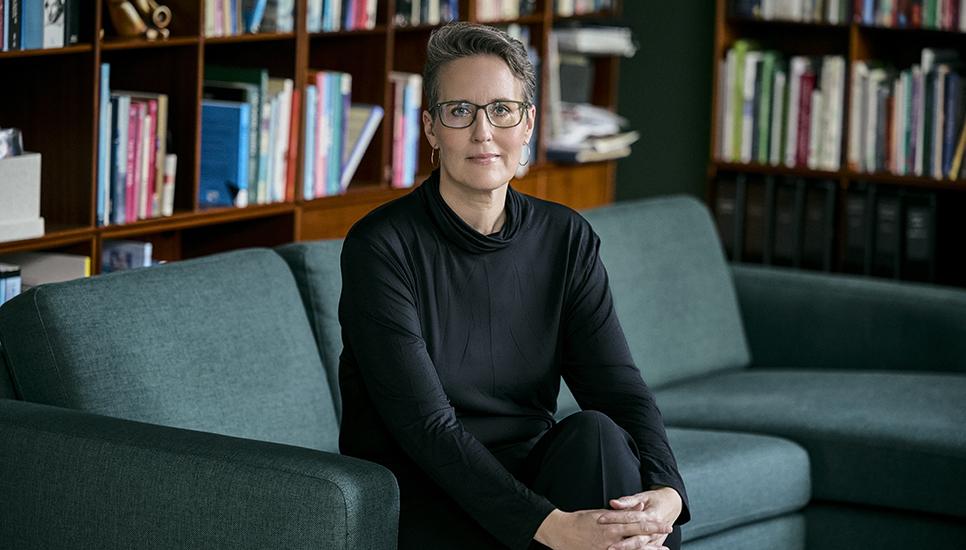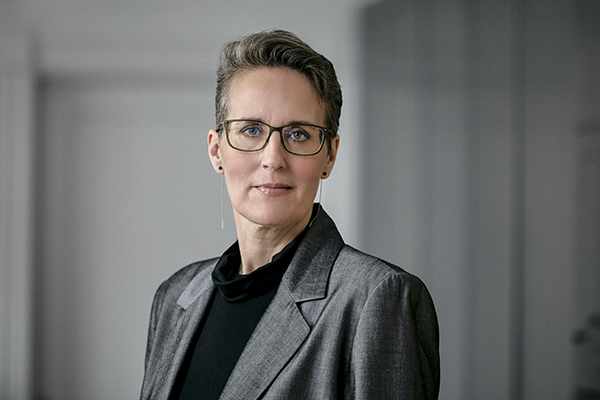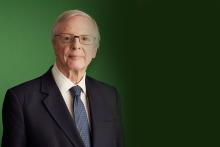Anne Kirstine Riemann: Embracing and understanding neurodiversity in business

When Anne Kirstine Riemann took over the running of Riemann A/S in 2002, her decisive and cognisant measures swiftly grew her Danish family business into a global concern, with an increased turnover of 500% and the establishment of a new state-of-the-art factory.
Empowered with an innate understanding of how to get things done, the second-generation businesswoman shepherded the P20 sun protection and Perspirex antiperspirant ranges manufacturer (founded by her father Claus Riemann in 1979) to new heights. And it’s this ability to nurture, analyse and problem solve that has since gone on to define her life and career.
Having been diagnosed with attention deficit hyperactivity disorder (ADHD) and autism after seeking a similar assessment for her eldest son, Anne Kirstine describes herself as having “had the good fortune to be able to channel the positive aspects of my neurodiverse (an umbrella term used to describe differences in the way people's brains work) think patterns into strategic analysis and problem-solving.”
Anne Kirstine has confidently worked in the mainstream business sphere for many years and has, by her own admission, “not been super affected by my issues” as she parlayed her strategic, analytical mind (“I can see complex problems like looking at a cityscape in my head, I can literally look at a road map inside my head and analyse a whole range of issues.”) into taking on projects and workloads that many others may have balked at.
It wasn’t always easy for Anne Kirstine, however. Having been told “by my father it was my destiny to eventually sit in his chair,” she followed him into the family firm. But as she rose to the position of managing director, she says she reached the point of an “alternative Peter Principle” where her true skills weren’t being used effectively due to the other demands of the role. This, and primarily because she wanted to centre her time more around the needs of her children, led her to instigate the sale of the family business.
“Having tried to bring in an external managing director three times and failing three times at finding the right fit [after an initial sale attempt fell through in 2015], I finally had to choose between the factory and my family,” she says. “I had three children, all of whom I later learned had special needs… and I wanted to concentrate solely on my sons.”
When you find your sweet spot as a neurodivergent person, you are usually much better at what you do than an neurotypical person because your brain is firing on so many more complex levels.
As the mother of three sons, the eldest aged 18 and twins aged 11, who have all been diagnosed with autism and ADHD (her oldest son has also been diagnosed with obsessive-compulsive disorder), Anne Kirstine has, since selling Riemann A/S to Norwegian conglomerate Orkla Group in 2017, dedicated herself to giving her children the best possible start in life.
“My ambition is that they get an education that can provide them with a good living,” she says of her sons’ potential careers, having noted their inherent skills of salesmanship and creativity. “I also aim to invest wisely, so they can choose their living according to their dreams, rather than have to slog through something that’s not interesting to them.”
With the benefit of her personal experiences, Anne Kirstine realises there are many neurodivergent people out there who may need help integrating into the workplace or, better yet, having business owners welcome a more alter-normative way of thinking.
“When you find your sweet spot as a neurodivergent person, you are usually much better at what you do than an neurotypical person because your brain is firing on so many more complex levels,” says Anne Kirstine, who is fluent in six languages and has an MBA from Columbia Business School and an MA in law from Copenhagen University.

Now absorbed in advocating for, and investing in, innovations that better facilitate the integration into an archetypally allistic world, Anne Kirstine is increasingly finding that family firms and the wider world of business are broadening their equal opportunity policies to accommodate neurodivergent employees, but, she says, there is much more work to be done.
“Every neurodivergent person has different issues, different things that help them concentrate and make them feel safe in their environment,” she says. “You can’t have a general tick list. For some people, it’s going to be that they can’t have sound around them, for others they can only think with headphones blasting music.
“For someone with ADHD, for instance, they can have days when they are able to work for 20 minutes and days when they are able to hyper focus for ten hours straight.”
There is nobody more loyal and hardworking than a neurodivergent person you’ve made feel safe in the workplace.
Following the sale of Riemann A/S, Anne Kirstine’s increased attention on what makes herself and her sons tick and how she can help guide them in the future has led to a new career in activistic investing, with a strong bias towards neurodivergence in the employee pool and product focus.
“As a leader of non-neurotypical people, you have to understand, especially with ADHD people, that their workflow will have up and down periods and you need to adjust your expectations accordingly,” she says.
“It’s super complicated to do it initially, but if you do it right there is nobody more loyal and hardworking than a neurodivergent person you’ve made feel safe in the workplace.
“I have an activist part of my portfolio focussed on those who have ideas that are going to make life better for this part of society,” she says. “It’s not usually something that’s supported by the norm of investors.
“One of the investments I’m super happy with is Return On Disability, a Canadian-based consulting firm which helps to integrate physically and psychologically disabled people into the workspace. Under Canadian law, it’s required that businesses have a plan to help integrate disabled individuals and this is a company that helps write this plan and implement it. I would love to find the right people to bring that concept to Europe.
“There are lots of solid businesses out there, but it’s so hard to find someone who will make room for neurodivergent entrepreneurs who need help focusing their brilliance into something that will work in the mainstream world.”
Neurodivergent families that do work together can do so amazingly.
Anne Kirstine advises that family businesses need to adapt to allow for neurodiverse Next Gens to become part of the family business should they be able and willing to.
“Obviously, it depends on what kind of divergence you’re talking about.. Autistic people need regularity, predictability, repetition… ADHD people need structure, but they will also get bored with routines extremely quickly.
“Neurodivergent families that do work together can do so amazingly. I think the world as a whole is becoming more and more aware of different abilities as a resource rather than a disability.
“I think it’s important that successful neurologically different people step up and talk about their expertise,” she says. “Time and cultural development are on the side of the neurodivergent, as is the mindset of the next generation, who are increasingly embracing divergence of all types – this variance is increasingly seen as something beautiful rather than something to be quashed.
“However, there’s still a long, hard slog to go, while you see seven times as many people with ADHD than the neurotypical population in entrepreneurial circles, you also see ten times more people with ADHD in jails than in the general population.
“Awareness alone is not going to make a difference. It’s being willing to act on the awareness and embracing the variance. That’s going to be where we can build new, interesting and positive businesses from.”







